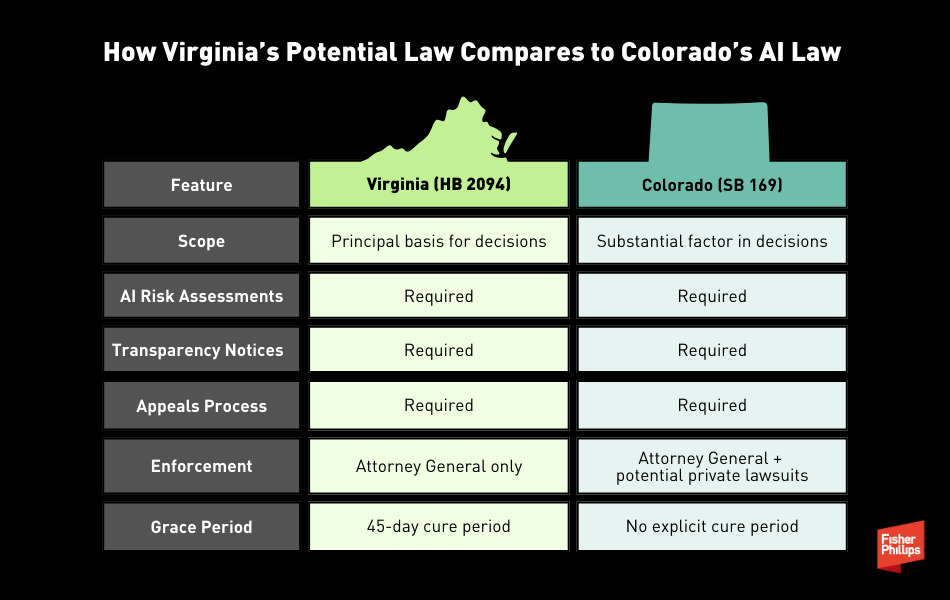Virginia lawmakers just passed a groundbreaking AI anti-discrimination bill, setting the stage for new workplace compliance obligations – but that’s only if Gov. Glenn Youngkin signs it into law. Following the lead of Colorado’s first-in-the-country state AI discrimination law, Virginia’s version, while more industry-friendly, would still require employers to prepare for significant oversight of AI-driven decision-making starting July 1, 2026. But there’s a significant chance that the Republican governor will veto this Democratic bill. Here’s what you need to know about this potential new law, whether you have operations in Virginia or not. [Ed. Note: Governor Youngkin vetoed this bill on March 24, meaning it will not take effect.]
What Happened?
The Virginia Senate passed HB 2094 on February 19, a week after the state House did the same. Both votes were narrow and along party lines, with the slim Democratic majority in both chambers edging out the Republican opposition (21-19 in the Senate, 51-47 in the House).
It now heads to Gov. Youngkin for final action. He is considered a moderate Republican and doesn’t always strictly follow party lines, but often supports the business community. Because of his business-friendly leanings and aversion to regulation, many government watchers expect him to veto this legislation. We’ll monitor the situation and provide updates as necessary. [Ed. Note: As noted above, Governor Youngkin vetoed this bill on March 24.]
What Are the Key Components of the Bill?
If enacted, the new law would introduce five key elements to state law when it comes to AI in the workplace starting July 1, 2026.
- AI Accountability: Businesses using AI in hiring, finance, healthcare, and other high-stakes decisions would need to exercise reasonable care to prevent algorithmic bias.
- Narrow Scope: Virginia’s law would only apply when AI is the principal basis for such decisions, whereas Colorado regulates AI as long as it is a substantial factor in an outcome.
- Focus on High-Risk AI: The law targets AI systems specifically designed to make consequential decisions autonomously, excluding lower-risk AI tools.
- Transparency and Compliance: Employers would need to conduct risk assessments, disclose AI usage to individuals affected, and allow appeals of AI-driven adverse decisions.
- No Private Right of Action: Unlike some workplace discrimination laws, only the Virginia Attorney General would be able to enforce violations – there would be no avenue for disgruntled applicants or employees to file lawsuits in court.
Who’s Covered?
Employers and businesses in Virginia deploying high-risk AI systems to make “consequential decisions” would be on the hook. That includes AI-powered tools that influence:
- Employment decisions (hiring, promotions, terminations, etc.)
- Lending and financial services
- Healthcare access
- Housing eligibility
- Insurance determinations
If your AI tools assist your operations rather than autonomously decide on their own, or if they’re designed for procedural support (like resume sorting), they may not qualify as “high-risk.”
3 Key Employer Compliance Obligations
If signed into law, Virginia employers would face three key compliance obligations.
AI Risk Management and Impact Assessments
Before deploying AI, employers would need to assess potential bias risks and document how AI makes decisions. They would also need to follow national standards such as NIST’s AI Risk Management Framework, while monitoring ongoing AI performance to detect discriminatory patterns.
Transparency and Notice Requirements
When AI makes a consequential decision, employers would need to inform affected individuals (such as applicants or employees) that AI was used and disclose the key factors influencing the decision. They would also need to offer an appeals process (with human review where feasible).
Taking Advantage of Cure Opportunities
Violations would lead to civil penalties up to $10,000 per willful offense. As noted above, the Virginia Attorney General would be the sole enforcer, meaning there would be no private right of action – at least for now. Even if targeted by the AG’s office, employers would get 45 days to cure violations before facing enforcement action.
How Virginia’s Potential Law Compares to Colorado’s AI Law
This bill has been compared to Colorado’s first-in-the-nation AI law, which you read about here. How do the two square up against each other?
What Virginia Employers Should Do Now
While it is still an open question as to whether this law will go into effect in 2026, you can take some basic steps to up your AI governance game and introduce best practices regardless:
✅ Audit AI Usage: Identify any AI-driven decision-making in hiring, finance, healthcare, and other regulated areas.
✅ Conduct Bias Testing: Ensure your AI tools undergo rigorous testing to prevent disparate impact.
✅ Update Policies: Implement AI governance frameworks that align with risk management best practices. Follow our 10-step guide to setting up your own AI governance system.
✅ Prepare Disclosure Processes: If the law takes effect, work with counsel to develop clear notice and appeal mechanisms to comply with the law.
Conclusion
We will continue to monitor developments and provide updates as warranted, so make sure you subscribe to Fisher Phillips’ Insight System to gather the most up-to-date information on AI and the workplace. Should you have any questions on the implications of these developments and how they may impact your operations, contact your Fisher Phillips attorney, the author of this Insight, any attorney in our Washington, D.C. office, or any attorney in our AI, Data, and Analytics Practice Group.



